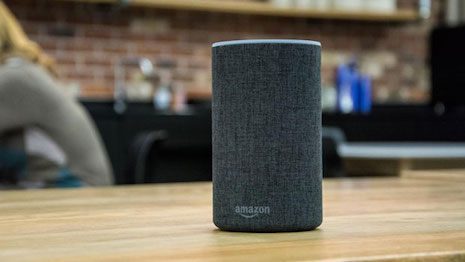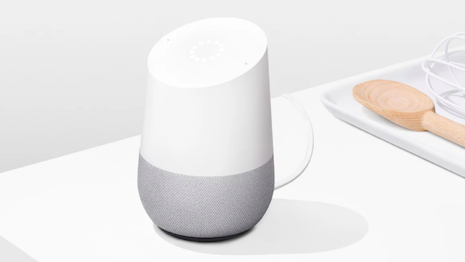Artificial intelligence has the potential to transform the travel industry as the technology becomes more sophisticated and consumer interest in voice assistants continues to increase.
As detailed in a report from EyeForTravel, travel’s place in voice assistance is currently small, but the potential is substantial. From January to October 2017, Amazon’s Alexa saw an increase of more than 18,000 skills added, which shows that voice tech is growing and the ability to easily assist consumers’ travel needs, hands free, makes it a potential game changer for the industry.
"One of the key takeaways from the research is that there is clearly an appetite for voice interactions," said Alex Hadwick, head of research at EyeForTravel, London. "The number of connected devices per person is rising globally, the growth in smart speakers is enormous and there appears to be strong growth in voice interactions via smartphones.
"This is pushing the leading players to triple digit year-on-year increases in users," he said. "Speaking from the perspective of the travel industry, Amazon is the forerunner so far."
Assisting with travel
Travel brands saw a significant boom during the rise of Google, in which these brands would sponsor ads on the search engine and saw effective results. However, after seeing the success of its sponsored search results, Google quickly inflated its costs per ad.
This is likely what will happen with voice assistants in the future. As devices such as Amazon Echo and Google Home become more popular with consumers and “skills” become more effective, development costs may swell as well.

By 2022, households will have an average of 50 connect devices. Image credit: Alexa
The potential is there for travel to flourish on voice assistants, but the technology is not there yet. When it comes to searching through voice, the experience can be cumbersome as results are not meant to be read aloud.
As developers continue to work on these devices, the experience will become more convenient and sophisticated.
Travel brands saw significant potential from chatbots in the last few years, helping consumers book travel, answer inquiries and usher in sales. Voice search could potentially be what is next on the horizon for travel.
HotelPlanner, London's Heathrow Airport, Trainline and Edwardian Hotels are a few travel brands learning to leverage voice assistants to usher in bookings and connect with consumers.
Booking platform HotelPlanner is developing skills for Amazon’s Alexa and its own AI assistant named Jessica. HotelPlanner’s CEO advised EyeForTravel that developers should not make their Alexa skills overly broad because users will start to ask it too much, become unsatisfied and leave bad reviews.
Heathrow Airport is developing a way for users to check on flight statuses through Alexa and potentially extend into bookings for flights and taxi services.

Heathrow airport is looking to Amazon Echo. Image credit: Heathrow
One major fallback the voice assistant industry has to overcome is consumers’ feeling silly talking to a speaker. Not many users feel comfortable speaking to voice assistants in public, which has caused Heathrow to scrap its idea of putting AI speakers in its airport.
Experiences such as Trainline’s application on Google Home that lets users ask a range of questions regarding train travel and receive real-time updates are likely where the industry is going. Consumers are able to quickly interact when they probably have bags or suitcases in their hands while on the way out.
Edwardian Hotels is striking out on its own and has brought voice capabilities to its butler service. The hotel brand is also looking into the idea of having AI-enabled speakers in each of its rooms.
Industries on Alexa
It is not just travel that has the potential to harness the voice assistant.
For instance, personal care group Coty Inc. is predicting a shift in the luxury market and opening a door for beauty brands to enter the untapped potential of artificial intelligence and voice control.
Coty has undergone an about face with Amazon, embracing a partnership with the recent foe in hopes to bring beauty tutorials into the future. Many experts believe that AI assistants such as Amazon’s Alexa will be vital going forward, which Coty is anticipating with its new skill (see more).
Moët Hennessy USA also developed a “Bottles and Bubbles” skill for Amazon’s virtual assistant Alexa to educate consumers about Champagne at home.
A number of brands and retailers have created skills for Amazon Alexa as a way to tap into the artificial intelligence trend by curating digital-enabled experiences. Moët Hennessy, the spirits division of luxury goods group LVMH, has been boosting its digital touchpoints recently as discovery and purchases are now more apt to happen via an electronic device (see more).
"Hotels are already deploying Alexa as a concierge, largely with positive results, although it is still at an early experimentation phase," EyeForTravel's Mr. Hadwick said. "Voice in the travel industry will largely remain as on-site help in the near future, such as a hotel concierge or an aid at an airport help desk.
"It is a lot easier to program a system to do a simple room service request than it is to organize your holiday," he said. "There just isn't the contextual capability in the AI yet to get meaningful results for the travel research phase from voice alone.
"Meanwhile, Apple runs the danger of falling behind in the voice race as Siri has been neglected by developers and they are not collecting data on the same industrial scale as Google."
{"ct":"QGT2tPSpUPULrZjepJaB+L8VqXyQU7pHJCKh5ujcavDbVPLSV6F9m9iceZpngPFyT+tbc36uciYhn7UgtqPqxhJRtC0gwe5E49SOoZVIZ15CEAnz+7DNtCY+9WN6bXPtuCVS8j7v1bRRXMWODmgYBw8g7Jb+BoJJKWg\/AvR+XwtAXMNDqfC7EFZgIVbRg7W3gv1UjUkLyIRf5ShUCYpTpbM2NClqAAI1ckrplys2QuLMAo3yRd4PGy72tDHEQjUgPaFHDtuGpqPtcNXuThaU\/H5rmn2xDZ3mbjsfCl4INNsEtWUJOyQpjGAFKsTb+7pesiz32MIjDOn70YEE3hJilEvi8pW1IB9UYDlWIOU8GWV7+homqE1wmXLq80OXDwYX+c\/VhqsU19HPa9q0WfQFcqI4eqT2gkQc2WOV3un5PdKL7163dNX+yESB34py38RuncZVZSfsXjjljG1u\/6Om0JpE6pZ65F64IiR2BzZvVWQAOjsiKVEhEbs0wWMc7iIW0cewsI1qFsyM4DusuedFw3bJr312sFvAANr5x7EKZwXCphJqRlDniqNuNUSNcjrjEGoc3ZRykIE97lW9oh1WVMJq9ORl9IYBKZGYmtWubcMT\/mVkSw7nFsF2j9b52SNuNVIlHWFOSIKB6VH9R2xBDgRmNiirDhLW\/N1Cgq4\/Vucf9eSBK\/sQY9Ci0fh2KAcNFTRqF82c2MdgVcAA\/r5uFQ0uK4FavLP6VvCSnUxsQeha\/d\/1GoSoScLVxyieymHOAvLHkhLMypIefPFPsIBF6vo33AqFrN3DSaS0H6Rh50Zv7js8TQRTWmeeBYjcQ8KwAqRrASSK1fsRLEUGTzgQJG9Ua+M+j9d8PyCF59XZWwpEAWiPFzEQMWMuJm2fWiMFxEDdBY8TfMH6Rx23LYABv\/iW0sTdJlHZ1gb+9LtcPO+MW23b4wHfZs68lzPc1aoIyoSJnNtTwTEsRfFuoSkZnO\/AOYSq5jP0pJ1DJzUtP5cdmIr4yqN\/1sYr5\/Rf5eRX3XrZgvTD+sMKi1EdgyVyiqZE7\/BUrariX64dBsybdPW7mrKXfm2P0dLJnNuc1UjZQsPPJx+bnYkkpsR8PgBBmX2OJC6Ssf61xxUDpHBcJ5\/Nkrkvfy9McEKkGdRY5\/x9NQz3Ve+BzeP2ni4qH8Pc7rNJdEb+PvRMdCy7klryNppocOxvnAGAuWurj2HKYxy\/nHsnb5hx6k0q5iK64cUjmgkdktFMfMnTFXEXh4o8+EJy9tTQLmmR52HI0doas+2ofhnCrDeUDcF6B1MYeJkJQ7qDkGR14tK6t51iOK6EVEGGzFXapkhcwCl2J9NVrSX328cDVghikNIZr3apqL95bFJBAC7cWQmTpm4mg9N\/oreZQYKLRZm3ASTFpFVpDmT0k3rEX28RWJ6M5HPP0tIUsrq4IV8KqsHLdwwpSMPvD2B\/FoTlkDUivucIZM+l30xmkF36tBOF7Ni47tQw+VJo0eLKE9\/pCJQk14b5L0JYBOhvrnWCAtWGDSMFWPYMgDmE2TNMNPZmABQNpNdIAklTHEcBlrUzp7SoguHPyDem2WItfuC8TxO5zFxEizx6M0O2et69pv7XzZCW\/Ow3DcPsfwE6VDAYwBgwpw1pou9J6By+VdVb6I3xFjV9vvtXz3OYYTFHyAdLcTn096GrlTnNnyW0EzGhmvNuBKv6aizvcVufab6jP4MwNwZ7DG5x+zyfW9hXNSEB\/IC0dH73RYxV9AWnziONLLNOOnITBXQvxxxhNof7LkDEM5lVAEwJkdLMD2MNphYVAKLRk94orQn1TXkcQmV3qDg\/y0bOpeL\/UG0gIyLw79X+3+rIs+uk7\/v5Jni9a8z8wP\/o0Sc+gUN4DnQILrP1wbYzslqyjACEJxB6jXWrw\/0CtuZKr66\/YCbn\/FGL02A5G7IhdC5v6ZULK5SlAemkaTDfjIKeeTc0vq\/oL8rbWRVVcOgGeR8fqd7PWQ2ayVg\/ruJcoDPpM77r0PsNC86cFT06Ess1XhuHM\/pdiB0nSjrMBksMei7hrTCDcZSBL71mcPBopXo\/DSpyjkNROP2Pu6auAJFvCnJG3CJ9nnbusUHkGtEQ0BGChnQFZpw3tH13xUH9pZttl6nhbTIfFBaH9wylOzfXOOkwUwMthzttu0Qk5vAm+Ahz8uNKqhk1Looiko4DRjFf\/GNc+q0J0oY1kbVd52Imcter+5nz5roIr8oIfdgnIvPUa3U498aAQR0VkCG1VPY\/d2pnGYdhZonJYPs6kiGSqi4MS2CKrPDSqFr7xQ0MyIi9Vj4XBVURamu92C\/KMQnyR1lQ7Zp3jFd6V8sZTWIBBALBUstKk+CmW6w421HprVowOMYS7YyVNDHGdXrrlFjfJB4b4nySPhvNH6ddPWNC8mXuvkCBxlIzYGqMvsY4YWDvoBqHG0W8eHcBfoc6yhMJDuxNPLoEJS+URyH5X0jzqvdVkrVn67QG9cZQTHlM0TOEUyAoz6ABJV3UFwIkaIbp5aetvJF4AKZiw2UllTg1GQ+kS0cDplbVzID9mFiA7ceK1TiOJ75hMPwAlpj1Il1RAct1LNsRX8w1Rs7NqGQPwfCQov6Y9Cqvrt4DIE6RfCKJ8QHWN3ZfC\/UxVtno4\/+ZtfJ2jwsNF7x5ceWB0Y+vtUeZH9GT3LMgmiPiw475MIhmefmU+3Oz61ALBcwOre+9KD6v3cgHJl4tVRvjVBYdIXuu4cnpQyKnPrJV6k5u3EHtDake\/qTsbIU9HL7dDYieI8b9P5o0\/QgmSK3gnlhpBl5rhr7R\/JngXwPLbSOpESMQRqkArGzydCGPAoqVI+xe2mAA2mU0NUVl6YUW4\/rF3cLhLMwOuAuE\/5fONSoNUGKfpyI9Y1K90GKtK5Is6lQ7hVXC2RCD3fBe4AUCZQgQRbCndKKdXBHql7GTTqJZ50UH9HB23b+57EpDCwLnliJQGWRnLevhLKKnQvmNvOSCGKRvjQow8zYE8b95feoMuC3DStjyUMmQhpI4T9mmwJuqFVSilC0W9OYRF4a7h\/cphIm\/yqomViehEVkYIYwy1yxZNh\/dHEHfDt4NrBGpKyjrOq9XH66skxfUAnzEiWfNgY\/tKWcOSDxiFaFs7WW5+cU1GZi9pVZ0qByoriLBmiQXGnkVm3nLBCJSG1Jai042ryM6ikvk36fLRgB9ND8Flexu1n3uPnVZka1I12Odv02r609iE66NxU9e0KU9CafnpfVrXD7v9TL7VjE+4aVvYO0cu9+o6\/kRloOQiO62qlOi5dmSaU7UJZAC11JMIhhGja8\/p9tymGmMPK2BM+2ptek5X8DaM1Zi01HGSgFqsxvU1NZr8kJxrhyluIcLHMNKuwBiyq4Q\/kBR3+TeavBmxdPL7k1QqQ1wOlAxEDipk\/BhGlNi+AZ2ZiLvGq9jYB5DQ73blqKv3CCQLZPTI\/JsyBTykMTsgPKRWy5jH8fN0YtToQ01V4qIptILlVNyvhP4cY61PG3RRvoHsRZoNy4IhkLQhMDPS9nssrRtkPcBVf+ZjtMar2ijBi5BMuDJ2qllLVmTU9ZaCcpMbGjjlRpk1j7Nk7RC07Xo4+tWw8ZD9j1BkkTZXQuRXHUO6SKYXOkhYtY\/tFDssXSXaSohYKFOrPKOp2dlStj3sERezcriAK1xkC49cG8cu9vl6cHaFmNIkZ53oDVL42hwsLnCc0928GCdincidBWuU8+nvU493rmsKIV00eIUB2epptTlMJ9kw6OKxzTWpYpyJepBdOPv6rgerC3v6MeeiSO7zgUFWLTC1MtRFu1jDVZEYhQJSB1Azg1vgfsbsUUkuVjHtZNO4lTh41TYRPNOOCvXHcACzuwc7QQ\/laOK7pwKOJTq8oItjnp+E\/pW9YXBhAEnRmIYxhN\/RugSMXpqnLrzkTATB6xAIietstE1GhPwfzzXlIUqY0AGS1cRf6s1i+lazFAFx4PLizehi6jKqbDjWzvqqqhFTzfjTz5paQ\/SGirat3HcJTplGrKQvQ9jgUNJVTJhK\/gZuywId22ZLehG4XbukTfX8CaErgycrp7XNxJUf\/vadXhlgNEvl9RMt8IGcRmS2a2tvQi+17CA5voJorJffQwZDlAyBlEqiW8Cfw6UTMrvJmamvilNOTqtt8XLzeT6kdpqkP+owGzzVQKIbhLOhCrAnrit90UBeZuBD1dikSIOxXJGNzDM7OGNSNpksAp74QMvDUlk7jJIUtg40ivv1FKYokJB+CDqarpP7tLDNWtHj6WETuxKdwtgf8NWW9MyCGfpfDs4EkrqlHRKTrACJTPA4u3wqRH3l\/eNXekCcFieSVZGfY2qgd83Ut+3rM7evkYTGmgf1\/d7DShFn3VWbOlgRZge5HM5AlOmW0lBb2L4qeuodDNE5GaJlGXf\/WNeX1g+B8VZ7\/XhLxK85Rh2AaiVxvzWf6ss8Df8M6XQmYQd2yuL\/vL0So9JLA1sn1cxPRujIMrL6X5RPMBPcq4DMBYD1kddr7kPYkt9wfJPU3Mkbh3bTkdO1tflvN0Mbq\/z2i4OiMP4KATluKbuI0UiCgfbG+VLDf3E1hHX67tTXDY1Oux8KnOX0gCPiSdSPoP2cWJwZB\/WSRgVOqjMlv6eDmjNIPlb8pqIzJ60ZyhrOCjXZxuk640u9IR46q\/RGKceEoCluqwceo9oPNyArTuQg7l\/xH0nsXRv\/oT1TlJr\/wtr8EYVpVloe8AC81MTyXOut64tzHbblkJmrYlC0S\/\/W+wKYiaW9PEjebqayEdCR9+Bfl+5Y3ydR0pxXTyClHwUkHSP7+3HBPaAVV8ADJuFck5z9n37DDvYW2K4IqobXMmn6Hy1AHr8f\/iKLHJrw0bjOQioLqj7moX+S0QI4ZVqqPcGWzz887wRu+u\/j5PiTQiLPsSm6bMZdQbh964eabnbX\/XWoQ7U1hCIRIl8iM+cbBbSlJTL9YT3wmPnhQDjWqqrmIrIPda2CGDqn2t+CM2ukL79z\/hMdjpBFgJrGT7JurU0US9qEWjezC1act88ey+rPnrFw4nzI+J2Z1g6Vg68jUsmYc0A9ZIVRTXNdA2g8buZ4oWL9GJV\/7iqnYXBnOR9\/dvs\/3dfgzsSISWy+2fLJq9t4zd5UgbLlxTKa4Ojvxiy4DkVnJM03e1Pb+2JcJRfqvdc7GbAj5PX3UH5XA4z+jsOpy02idR0y9sRl0ixykjbFXxc4wRSlEPl7ICVLv8xCy8aGFWG+HkhvNcIOTNiyiLpZfEcbNCsIp21nwlhztId93MTpgspv6KnprZouJYo9R8xzfEyAJX9mBXnO8Tr1BBHOoV5tScaniXEg80724DaZv6qsOLZVNQUgJGPIhj0e\/v2Y708pySrESAeao8gLfXP1EcaPL\/fEHP\/CsX7BH4AbaBLEqlwe5cdefDl19tqBxqJuXd5Wpyzz0YQZ1sc4JkBXUz3\/QCcK0aLjILJ7Xc41XG36Rr5\/Zup+neUVCSr3eJedOisA+9qK6rYpJwWwX7RSuEKVrtZKYYhjVJi\/p+VvynEFURIOpnTqQty5CRGqkb5+KCMg6LjsJYKBwss1cJ\/wETNZ\/7EqdS9eyvSFewFuxfkyANzp3k\/PpP9Nfr4F6aA83+gk2Yh7VgPx9VLUlmor4LYuFKUX0zgozIAiW\/fluA358b1xyaECQSWMqo2U3Qbv1w8ls3o3ZgeBC3Bu7qMCbbqccS76JmpGZABvUQk6g8dEA9o5qXMraRFcqmrgOLcRxui0FUH0xnz+CCBCh\/MgV3714tMH0sKF8\/AJlpzCfOjcnCPOkZZgYBem7elwsRedeR8qZ89YRZPB3wayVqbqAaOTjVFeuSqkO3JamORtUacx9iaxOTk+b3G0ZrLme0PzxTp42VtbsL+PNFbvpfIyxosbIHi2eyBl\/5BcrIhFVK+s8pWyzUMg6cxo\/mUB\/3hLso2ow+eNfo418JWY84NX2dFtN9KMnwbLRHHn1KA5YTmiIlASXfVgMZIusHrtcqqkFF1UhOjfzl8FC\/ogUv3\/1\/Ms9Em9\/WNkjS4xXGataXv8mQOezaZrx4BcRc6Cbi30sqxBM0Hpiz\/zCKsD7X2lmoDiYqxf6TTB+QzGbqGlYi71vw2aJZno2u59TPkxW\/6oNg9Lt9S2SFX5T6bWPFknTrxHV5l3KSYQokSI2JD8xmzzxppaXNam1p5GGDcueb64t1AtLH3KP4Vcyijb7izgGiFlg8pPA\/kCp5zawphIXsaMtBWugF2I6x5yvpDCGQfCCkA8oNfdFFLqTagqie3zGhIg5nddcHEOHWm62shyfYl3eUFi9+gWvf41ukIA9u78euQmYey9dbrmhXGVJ0GQYvuxmTpWNkUoRLc1RDgOT0MvFZQmILppynCyHR\/KzkaBYR5dmFdO6RDDWmkR1Xu5YVBH6nXHTLq3PCN1a2ECM8yAgYxXLn1VQPeeXnFlgwQXePKi5wr6dqO5mQQPDVaQCi5cjGUtUwh+KrXzAg00JS\/Qvl2d6wdkOwf5LYV1G7UFTQ5PDuYUYvbjCKSKVYpZUbBahr8ArqpAIzuQAcO2PlqWuI\/zJRZ4PSrIIrFv90ytT1d2R68ytuKuQxozf6+vvoWouQ6nnWqdW45VUESeH74rWWmc3mfEVMf81jhkJADrqVcx4\/2uDgFNp594bFpYI056+++fJp\/qctfcjzOaNUpXaZpDkeJSqifyyhv8TrpumwMHWzN4Q0jzTq8EC+yIofX1Lzkdn5IoyMPGr3qeOHqJXiipn9o0skq\/bbf1yFLlLj41kdL0ZIgChrOmpW4x9FLBb9dt7aSuQn15vpmE6DMnV6Gz0u0c1zzw+EXfAV2g5loKA9QjYvXjQC0jsLzydRAKMkYg8YB3WpU1793Q+TtT1vMGviXynqwO0qKt60q+X8si4vGpOIoTYX7mdEmYI7azznS0r6exanXH4EiUfdEnLvfOip6IqxjoiRxUEa7qcbrxFBSs2dVIlO7lcwgWJfOrBXr28t0MBZhRgKl+i2cUFpaMK1DJy7FVqO8qrTylBuelqDcnXO4x7M+aTAYoEmX2LYH5aD8c2iT8wV+GEMPbNWYHsWHFJLr\/vUpxINP1TIhFgaF8W9Ss4+bZMP0E67\/zFNY8wE8b0AG+WRbmyB+UU27o4GO9d3loVCQu0G07F+lnZi5vXyUZv11EbnY+dl9kQvJGVuEmr56mGoo3RpE7aMade1XmOwu7YHB0r762wTmtF6RJpAb7jxPtSIkQrfzCkg6eC5LJ9IMwzQvx8ekxpoh7A5BobGlaiiR9ketWVO92eUXtrp\/artNHdbleNXPiGWR+4VJJ6TtAjE1MwHhQ1dQgm\/aPnbKgUkJVmcBvuoFdelFBjTUmx9+piWurqEFx5ONcydFKzLAlbOxgZ3TTbgLI7BDpgKZA8muakBbox8\/L3v\/xwqJilkjWZstNT6uZdEd9A7RDZM+VLm2viZg3Vh4\/k2fnOUwi1l7rJUNGefUEpuqiKqBP5heD7HlICgsHF04sJYCCDXgu2ekqhiv0qhRxDwF\/AMtSiyvCUHlevs5fScOCIzLrrream\/kxGE7SWzzF\/h0BaeAtDo1yquVaPisvXrZuOrUsJplcl3gU\/iemt3YrqarKlVKsi1rksfiKL6247rKVld6w+tSf9d6M4E7wEfTzX95qNQsuliSZt9suDXYfetmq+5KajZ+U2AtO+JnOwGKO4B46LwcZ3MVg4ITz+9+cjPDNE9b47R7ABHe+pt8vuzHwfQ7NE9fHZtr6fUSnz5Qbp81TYVvXnd1Czl4Mvru1lhcFSOKFSVb\/M+p\/SenyCcIiXPNeUtFwXfS7lo9xRTSn3ZnVz4xMuPhO0vMrORjtIM\/4iqzzHLUmecWJJH3Rj346YTxVlsP3oXBdu9Mow6Ot4wMxtIrJ\/scB\/OGq4BhKvHSQ7c5PdsFLHcK\/scoGOJAhzVDrOiH5ekA54u1gvISdj+EjcRMdB5KggnvwPCYl+lx1vH9HA8WmVWQfj1ht5YDOfagtA\/B\/I7cy0r2sNbj0u9aRn6q6CjvBoyKwdH97+kNjao40kjlHf3p7x7K0Iz7jfNx0W9dSFo4xDcag2tfNIEJsW9R9PtMc2+BHa2agCc6BnX514C0QNcYwm+TJxI1NCh6XfKba7uBbXqA81xCcN7ERkcmows8Dal3C8cC4ebfLYnX7lsgE31uTxqA6EC30kdtaUb7lYPxIQ4vwC1g9jFm4dCtBXascSqIcsYB0ZLqaMShlBBbQQF9wDlHFWL4AT5CDdPj4YG3nJt0SgUrdzgyzwAFSg2Ge7ZW1oNoH0MpkBL\/rw3tQ8Saj\/8F3sPpJtzOIjmSkHXWaBCbl+EULrYNaqSamPEg4ZqIo1cZbzefV6og5dG+AVR7xEIAw89K7zleeWJUkZhO\/uRYmKAve7PGjbYwU31iJJEoMjJgLAabs5WpP\/mJXmJxXqaNMJLubWp22re1PWUB8QYMdYQD7A5URRQzUw\/NHyC98BYlC1mFrxxBg1oXEXi1lhChCKPN469hB6wrjz\/F96q\/plCl\/S3zf36Dp3leFuRoZnjF93JM+k2YULhZ1FAzTxEqN072A2viZggUuUTjfXDzOg4+SwwX8x6GLZSofZYh\/TsfXm2ztERRJ6y2Z0\/NaYWaYrNgRLczmnqzX\/6Lj+UxS3Sr4hzfTp8n6RM6wye\/HAXiZvcWBTGgMMNAY9BA7p7leD8qBuIsN4MD3MjxLf3NNUhSYGAfhKb2qosChoqaw\/Ww6QzOCXs2Dhv6OmQ\/eHLV8olK5UGi33BbNbj5Mwb7Q7L6ucTtP+CizNDg3gkJfMDio4PMI0+7dbRpPvbYEAke1gHlf1o2TCDHjIm1q4aG0A5c7Hu7OjUoWKXpKGuMDglu7bUx+8XytrZO0cOYXTM6cdx5z1tqgwSyAMddg9TIdPLB79QTaWgbsz8OBducfOMqir\/gFoM4U2EvWM6ndOkPsGrUG5tBhmd4WbGb0tFtXJXdHF5TLRlYElRVrGPWdlX+bFxwL2aEfYNzXsRXwane5egNP9rGt5441\/SMe12YR1F1KXe196KjjntmhBhNmQ4qiJ4D8U9rJSmUzP06IpvLU8Pg+LU1Dv5sHtfnVF2C\/zlyj7wkW4DuLy0j3vpJLolZnZcL0ZnvP4EY4FjA0UXkH18h2XWeFVhM+rry1xRsy3UzUj2\/J\/0mNJRVV9nkT568WR8yJalL84DpalXeAnsr0KUS2rhPvuSmxiJ\/fRiQesFVadJvEhFU110\/P\/IT+aRggKVOoKmMuS9nQ8ihEe8kO6nt6K6b61aU+kHaJmXhvV84Y3SNeEjWXuNjBRZfDYGQHKZfia9Xqu7k0MYrEU1OheLtY70IcmRpJVO0orgx7ha+qDlgQz1HR0rlACtCPuMLi\/sfWb6w5SPUSq5D0B8pfXEd21WMLzQMlEzrl0RXvVvvMDQImRckLuCiXD7WhpKI1ZwlWio1HcSgw6Xe\/ovH5FoI1fIJgKA2YixW","iv":"7d999d2584f319223bc5813560f333ec","s":"87c8baf8b1859846"}

 Voice assistants such as Google Home are gaining traction. Image credit: Google
Voice assistants such as Google Home are gaining traction. Image credit: Google